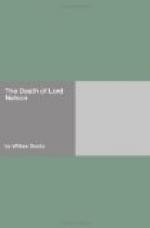His Lordship now requested the Surgeon, who had been previously absent a short time attending Mr. Rivers, to return to the wounded, and give his assistance to such of them as he could be useful to; “for,” said he, “you can do nothing for me.” The Surgeon assured him that the Assistant Surgeons were doing every thing that could be effected for those unfortunate men; but on his LORDSHIP’s several times repeating his injunctions to that purpose, he left him surrounded by Doctor Scott, Mr. Burke, and two of his LORDSHIP’S domestics. After the Surgeon had been absent a few minutes attending Lieutenants Peake and Reeves of the Marines, who were wounded, he was called by Doctor Scott to his Lordship, who said: “Ah, Mr. Beatty! I have sent for you to say, what I forgot to tell you before, that all power of motion and feeling below my breast are gone; and you” continued he, “very well know I can live but a short time.” The emphatic manner in which he pronounced these last words, left no doubt in the Surgeon’s mind, that he adverted to the case of a man who had some months before received a mortal injury of the spine on board the Victory, and had laboured under similar privations of sense and muscular motion. The case had made a great impression on Lord Nelson: he was anxious to know the cause of such symptoms, which was accordingly explained to him; and he now appeared to apply the situation and fate of this man to himself.[13] The Surgeon answered, “My Lord, you told me so before:” but he now examined the extremities, to ascertain the fact; when his Lordship said, “Ah, Beatty! I am too certain of it: Scott and Burke have tried it already. You know I am gone.” The Surgeon replied: “My Lord, unhappily for our Country, nothing can be done for you;” and having made this declaration he was so much affected, that he turned round and withdrew a few steps to conceal his emotions. His Lordship said: “I know it. I feel something rising in my breast,” putting his hand on his left side, “which tells me I am gone.” Drink was recommended liberally, and Doctor Scott and Mr. Burke fanned him with paper. He often exclaimed, “God be praised, I have done my duty;” and upon the Surgeon’s inquiring whether his pain was still very great, he declared, “it continued so very severe, that he wished he was dead. Yet,” said he in a lower voice, “one would like to live a little longer, too:” and after a pause of a few minutes, he added in the same tone, “What would become of poor Lady Hamilton, if she knew my situation!”




